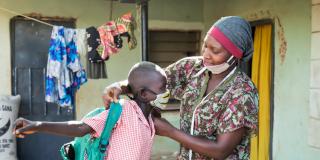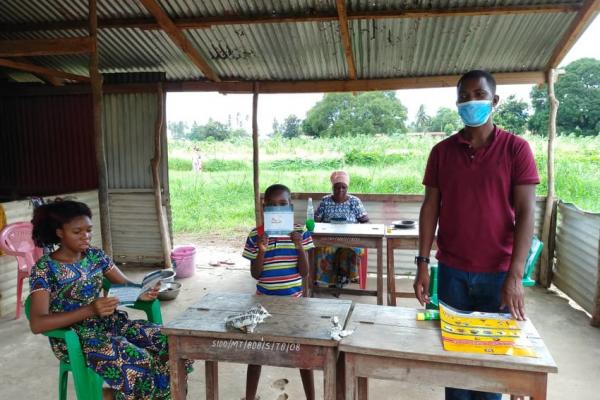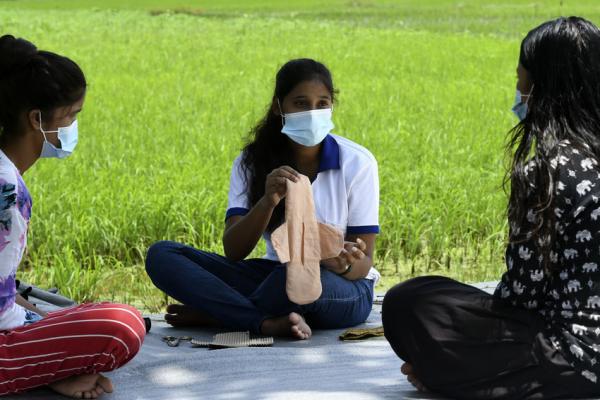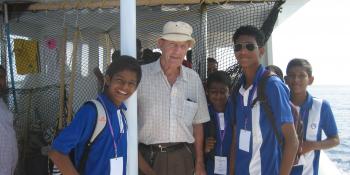
The impact of the Coronavirus pandemic shook the world, changing all of our lives and taking a devastating toll on so many. In spite of the challenges of travel and the increased difficulty of working in communities, VSO volunteers have continued supporting the most vulnerable throughout this crisis.
Thanks to our dedicated volunteers, we were able to adapt 80% of VSO programmes to respond to the crisis, in just 10 days. Here are stories from some of the volunteers who made this possible.
Supporting farmers to stay safe and protect incomes

Avitus, 35, is a volunteer on the Rural Indigenous Sustainable Education (RISE) project in Kamachumu, Tanzania. Since COVID-19 hit, he has been making sure the farmers he normally supports have the information they need to help prevent the spread of the disease, whilst also being able to continue getting an income for their produce.
“I train, coach and mentor farmers on good practices such as land preparation, nursery preparation and management, crop management fertilizers application, planting and harvesting.” says Avitus.
“In responding to COVID-19, I have adapted my work as a volunteer, focusing on health and safety of farmers. While doing my activities, I provided support to farmers and their families in following the Ministry of Health guidelines, such as hand washing, physical distancing, and promoting hygienic practices. I also have shown the farmers on how to set up hand washing points using locally available materials.
“I have been also supporting farmers with information on available markets during this period of COVID-19 where they can buy and sell their agricultural products while protecting themselves and their clients. I also encourage farmers (especially ultra-vulnerable farmers) to store enough food to ensure families are food secure in case of total or partial lockdown.
“I also discuss the socio-economic impacts of this disease with the community. It is important for them to be resilient during this difficult time of pandemic, including knowing how to maintain an income from their produce. I am planning to start using a public announcement (PA) system to promote health education and raise awareness on COVID 19.”
The youths challenging misinformation
Myths and misinformation about COVID-19 have particularly impacted those in remote communities, making it hard for people to find trustworthy sources of information. In this environment, false claims about cures and prevention, scams, manipulated videos and conspiracy theories thrive.
Also known as an ‘infodemic’, misinformation can make the impact of the pandemic worse, as when so many theories are spread around, it makes it harder for people to find reliable and trustworthy information about how to stay safe.
In Zimbabwe, a team of 16 VSO youth volunteers, known as the Youth Engagement Action Team, have worked with communities to debunk myths, share tips for spotting fake news, and spread scientifically accurate messages. They exposed false claims that people of African descent cannot get COVID-19 or that drinking alcohol provides immunity. They also showed how documents that appear to be ‘official’ can be used to spread disinformation.
The team in Zimbabwe are part of a wider Youth Engagement Network established by VSO, that supports young people to volunteer in their communities. Many former International Citizen Service (ICS) volunteers – inspired by their experience - are involved. These networks demonstrate the power of young people to create and deliver change.
Using technology to keep girls learning
COVID-19 response
How we’re adapting our work in response to the COVID-19 pandemic.
When schools shut down in Nepal VSO volunteers stepped up to ensure no child was left behind. Muni was a Big Sister on the Sisters for Sisters' programme who continued to provide safety information and training to the little sisters in her community throughout the pandemic.
“During lockdown, I was in regular contact with all of my little sisters through mobile phone. I also raised awareness about COVID-19 and safety information, which I receive from online training provided by the Sisters for Sisters’ project.”
Annual review 2020-21We were able to adapt 80% of VSO programmes to respond to the crisis, in just 10 days.

15-year-old ‘little sister’ Anjali describes the impact Muni had on her life, “When I was 10 years old, I would rarely go to school as I was occupied with house chores. My parents also didn’t find it important for me. It was Big Sister Muni who came and talked with my parents about how important it is for me to access education.”
Anjali explains, “Most of my days during lockdown were spent doing house chores and taking care of my nephews. The schools were closed, and we were unable to get an education.” During lockdown our Big Sisters engaged with parents to encourage them to prioritise girls' education, not chores and marriage.
Despite face-to-face mentoring being impossible, Muni persevered. “Big Sister Muni called me and informed me about the virus and how we can protect ourselves. Through mobile mentoring, Muni informed us that if we take the proper precaution of washing hands and not going out from home without any urgency, we will stay protected.”
Muni also distributed hygiene kit for the girls in the community and taught them how to make reusable sanitary pads at home when the shops were closed.
Read our annual review
Find out more about how VSO volunteers have responded to the pandemic this year.
Read more

Transforming lives through education: Geoffrey’s VSO legacy
With a deep belief in the transformative power of education, Geoffrey from Norfolk, UK, has devoted his life both in the UK and abroad to making education more accessible for all.
